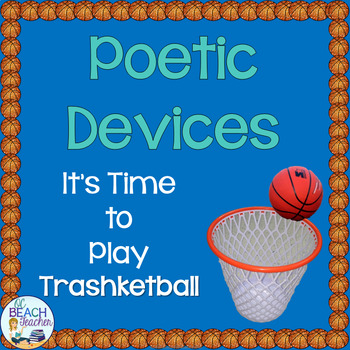Poetry Terms - Figurative Language - Literary Devices Trashketball Game
- PPTX
What educators are saying
Also included in
- This poetry bundle includes a variety of reading, writing, and review activities for your next poetry unit. These lessons inspire students with various poetic forms, authors, and creative activities and can be used during National Poetry Month or any time during the year. Lessons include the followiPrice $13.30Original Price $20.00Save $6.70
Description
Have fun reviewing poetic devices in the context of lines from classic poems with this interactive game! Types of figurative language reviewed are metaphor, simile, allusion, personification, and hyperbole. Sound devices reviewed are alliteration, caesura, couplet, onomatopoeia, and iambic pentameter.
All that you need to play is the ability to project a PowerPoint presentation, a soft ball, dark tape, and a trash can. Students compete to shoot baskets into your classroom trash can!
There are four rounds. In round one, the students simply identify the figurative language demonstrated in the lines. In round two, they must also explain their answers. Rounds three and four are played the same way but focus on sound devices in poetry.
This PowerPoint presentation includes the following:
- concept review
- game play
- game rules for students
- teacher instructions
- answer key
Poetry examples come from the following poems:
- "I Wandered Lonely as a Cloud" by William Wordsworth
- "Kubla Khan" by Samuel Taylor Coleridge
- "Chicago" by Carl Sandburg
- "Dover Beach" by Mathew Arnold
- "Sailing to Byzantium" by William Butler Yeats
- "Metaphors" by Sylvia Plath
- "The Fish" by Elizabeth Bishop
- "Concord Hymn" by Ralph Waldo Emerson
- "Vacation" by Rita Dove
- "The Eagle" by Alfred, Lord Tennyson
- "Making a Fist" by Naomi Shihab Nye
- "As I Walked Out One Evening" by W.H. Auden
- "Let America Be America Again" by Langston Hughes
- "I Heard a Fly Buzz" by Emily Dickinson
- "We Real Cool" by Gwendolyn Brooks
- "The Man He Killed" by Thomas Hardy
- "Beat! Beat! Drums" by Walt Whitman
- "Sonnet 73" by William Shakespeare
- "Because I Could Not Stop for Death" by Emily Dickinson
- "The Bells" by Edgar Allan Poe
- "To My Dear and Loving Husband" by Anne Bradstreet
- "Aunt Jennifer’s Tigers" by Adrienne Rich
Research shows that students often learn best when they can move, and this activity motivates students further by tapping into their love of sports. Using heterogeneous groups to play a game with friendly competition is an excellent way to meet the needs of all of your students and reward them for their success.
If you and your students enjoy the game, be sure to check out some of my other Trashketball games:
Word Parts (Prefix) Review Game
Hyphens, Dashes, and Parentheses Review Game
Meaningful and Memorable English Language Arts by © OCBeachTeacher ™
All rights reserved by author.
Limited to use by purchaser only.
Group licenses available.
Not for public display.






